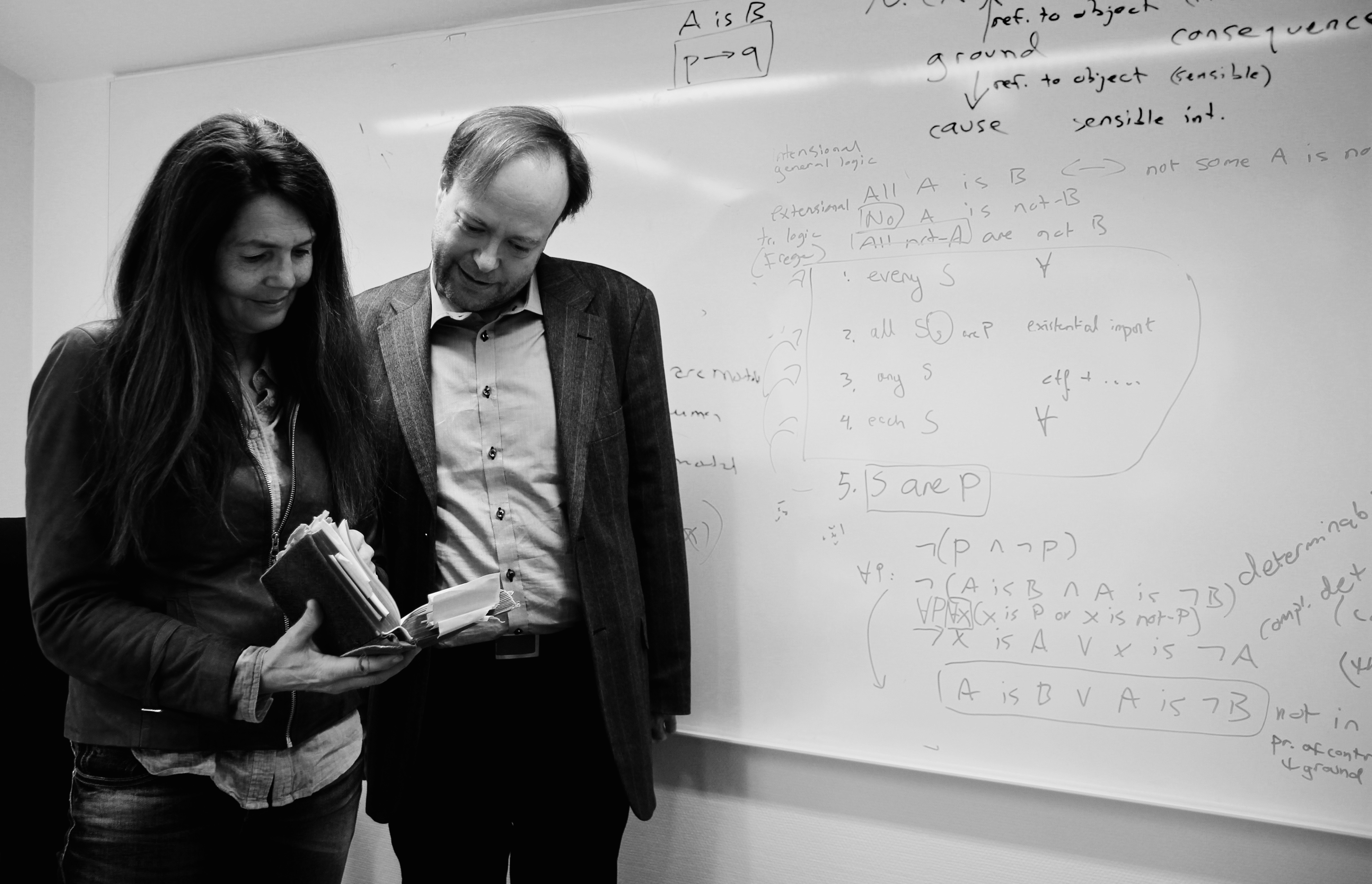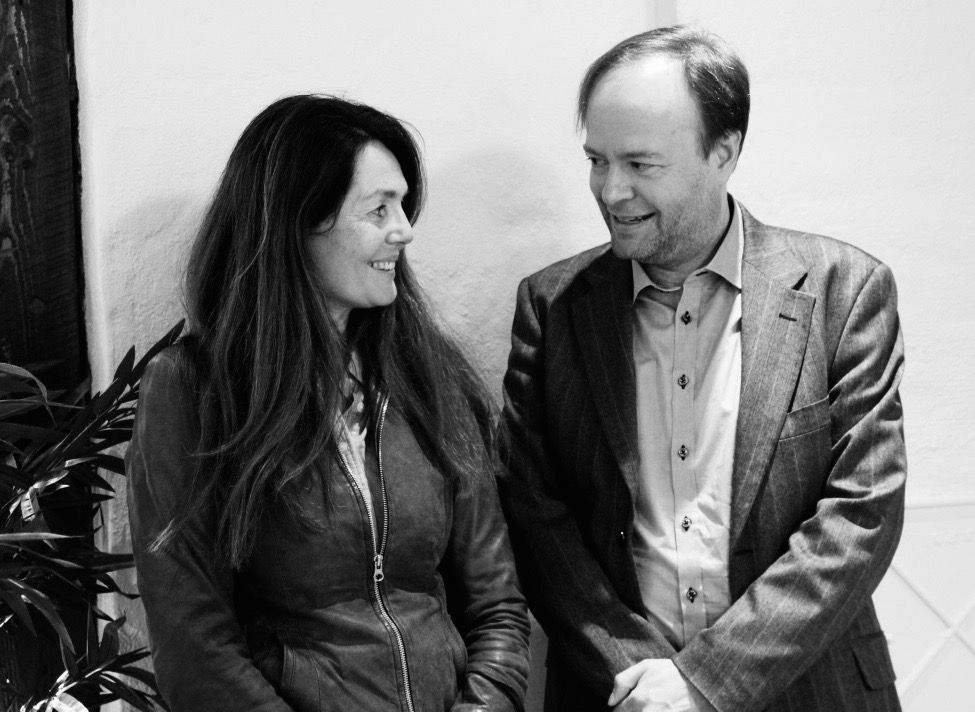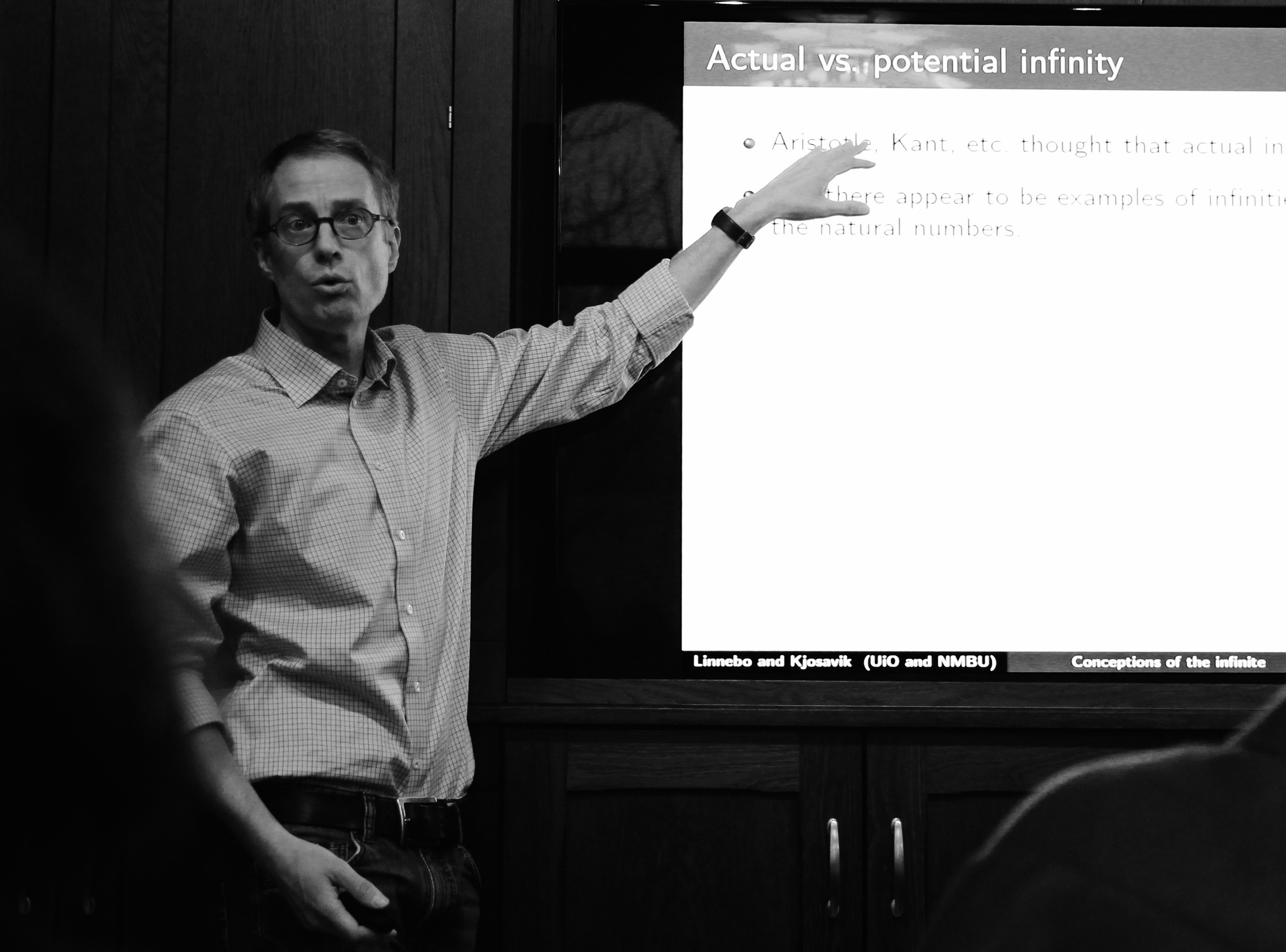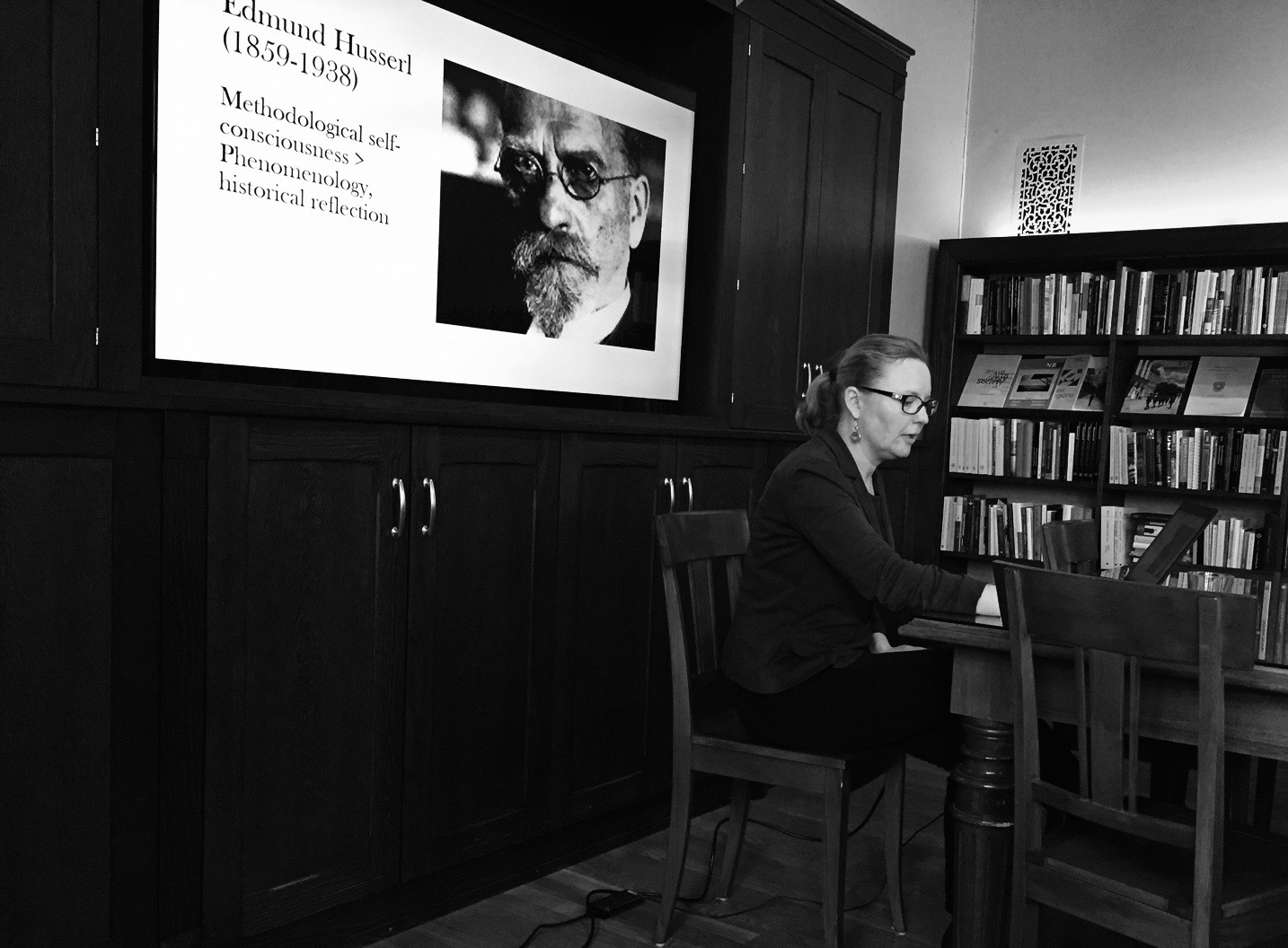Beyond the limits of science

We meet at Kjosavik’s office to talk about the project with probably the least graspable title at CAS this year: Disclosing the fabric of reality- The possibility of metaphysics in the age of science. The research group, which consists of researchers from Finland, Germany, the USA, and Norway, argue that even in an enlightened, science-informed world there are some questions the sciences themselves do not have the tools to answer. Serck-Hanssen opens our discussion on philosophers:
– We can afford to think of science itself as being part of an era and a culture. History shows that it is not clear whether a theory is the ‘final theory’ that we will have.
Metaphysics is a branch of philosophy that asks the most basic questions about reality and existence. Serck-Hanssen and Kjosavik ask what exists independently of humans; for example—‘Were natural numbers invented or discovered’? They are engaged in causality, where what is explored is what kind of entity can be a cause, and what can be an effect, and what this means. Serck-Hanssen continues:
– It might seem a bit abstract, and in a way it is, but many of these questions have enormous implications for the way we think about ourselves and the way we organise not only our sciences but our politics and our communities.
To help them navigate the metaphysical landscape are three men who lived between the 1700s and the 1900s: Immanuel Kant, Gottlob Frege, and Edmund Husserl. What makes these philosophers relevant today and for this project is their concern for science, according to Serck-Hanssen and Kjosavik.
In the current project, their theories are used to question the sciences metaphysically, and the group aims to develop something new and unique: a general framework for metaphysics that is both systematic and informed by the sciences. Kjosavik explains:
– There is no framework for a common way of doing metaphysics. Each philosopher has her/his way of doing it, but we should have a general framework, and it should be informed by the sciences.
Physicists still don’t know what matter is
The philosophers occupy the offices on the top floor of CAS, and they can often be found deep in discussion in the hallway, or gathered around the coffee machine. It is a different kind of academic year for Serck-Hanssen and Kjosavik, who usually work at the University of Oslo (UiO) and the Norwegian University of Life Sciences (NMBU), respectively.
Serck-Hanssen enthuses about the experience, saying that she has learnt more in the past three months at the Centre than over the past ten years:
– It’s incredibly intellectually stimulating to be here at CAS.
Both scholars describe their year at CAS as a unique opportunity, shielded from ‘the external world’. To be in reachable distance of co-philosophers is especially highlighted as a great benefit. Serck-Hanssen says:
– I think it has been very common in philosophy to work on your own, so it is an amazing advantage to be able to talk to people. At CAS I can just go to Frode or others in the group and ask: ‘What do you think?’ That is incredibly fruitful. I am surprised. It’s incredibly intellectually stimulating to be here at CAS.
Serck-Hanssen describes the questions posed in this project as some of the most pervasive and long-lasting in the history of philosophy:
– For a long period these questions were governed by and intertwined with religious puzzles. And now, as our title indicates, what is more standard in our generation is how these questions relate to the kinds of questions posed in science.
What do you mean by ‘disclosing the fabric of reality’?
Kjosavik replies:
– The fabric of reality is about the structure of reality. What is there and what is connected. We have material objects, mental objects, and in mathematics even abstract objects, like numbers. There are certain building blocks and principles, for instance—there are laws for how matter is connected. You have causality, which keeps it all together. That is the physical reality.
Serck-Hanssen adds:
– In order to explain the way things appear to hang together, how much do you have to assume is there, as Frode said, as the first elements and building blocks?
Since the answers are so complex and without material or worldly proof, it is a philosophical debate as to whether metaphysics is even possible. Ergo, the possibility of metaphysics in the project title. Throughout history, some philosophers have claimed that questions posed in metaphysics are impossible to answer and, thus, have denied the possibility of metaphysics.
For instance, one of the most prominent empiricist philosophers, David Hume (1711–1776), suggested that any metaphysical statement was meaningless since it could not be proved empirically. Kant criticised empiricism as well as its counterpart rationalism. According to the Hume, everything must be experienced in order to exist, and according to Kant, humans can portray an accurate image of the world through reason.
Kant incorporated both beliefs in his philosophy: some things we do know exist and some things we do not. Kjosavik adds:
– There are those who hold that it is impossible for humans to answer these questions, but you also have those who think there are some questions impossible to answer and some that are possible to answer. Kant, Frege, and Husserl believed that everything has to be connected in all the sciences and connected to metaphysics. They are very important in that way.

According to Kjosavik and Serck-Hanssen, metaphysics is not rendered out of date by scientific developments since the Enlightenment. Rather, scientific advances bring with them new questions. Kjosavik argues:
– We think there is also room to ask these questions in the age of science. It raises a lot of deep questions that force themselves upon us within the sciences, which cannot be fully dealt with within the sciences themselves. For instance, in physics you presuppose that there is something physical. If you ask what that is, you get something very fundamental. Physicists still don’t know fully what that is.
Serck-Hanssen elaborates, observing that there is a tendency among well-known scientists to approach questions that belong in metaphysics, not science. According to Kant, one must use scientists’ insight, which is both important and true within a certain domain. However, some have had a tendency to apply it in domains where it is not legitimate, she explains:
– I believe that is really important and a topical insight today as well.
Why is it so important to ask metaphysical questions relating to science?
Kjosavik responds:
– First of all, it has to do with the human condition as such: free will, personal responsibility, and self-determination. The other reason would be deep questions within the sciences: are scientists working on some kind of abstract structures? Are they just manipulating symbols? Physicists cannot really say what physical causation is. Somehow their domain is still limited. I think many scientists themselves are quite curious with regard to these issues.
Are natural numbers invented or were they discovered?
Serck-Hanssen and Kjosavik find mathematics very interesting to pursue metaphysically, because it is abstract, yet few would question its legitimacy. They ask questions such as: Are natural numbers invented or were they discovered? Serck-Hanssen elaborates:
– The question is then: how much is there independently of us and how much is dependent on us? The mathematician Leopold Kronecker said that God made the whole numbers and the rest is made by humans. At least these natural numbers have a kind of independent existence, but from them you can construct other numbers. Within the philosophy of mathematics one view is that you can have mathematical objects that are independent of us, but you can find out more and more about these objects. Therefore, we do not normally say that mathematicians are inventors. We do not ask when the number two was invented—we think of them as discoveries. It is really interesting when you start thinking of abstract objects, such as in mathematics, as being as real as tables and chairs. Then some other interesting possibilities arise, and that is another—quite different—realm of discussion. If you think that the only thing that exists is something you can observe, you are already in trouble.
She continues, explaining further:
– It is about ethics … it is a widespread assumption that you cannot have moral facts: facts about what is wrong and what is right. However, the debates often used to argue against a possible moral fact: moral facts are impossible because they are unobservable. This is not a good argument. If you think that the only thing that exists is something you can observe, you are already in trouble. We can, for instance, not observe the past—what about the world before humans? Did that not exist? Moreover, you cannot touch, see, or smell numbers, relations, or sets either. We know that it is a very strong psychological tendency to not believe that there are other things than what we actually observe. An important step is to let people see that reality can consist of more than this.
Serck-Hanssen adds that contemporary science makes many assumptions about things we cannot observe in any real sense—in theoretical physics, for instance:
– But you usually say that it has to lead to some kind of observable effect—in some kind of test situation, at least. In natural science it would require some kind of, at least inferred, observability. In mathematics there is no such possibility …
Kjosavik interjects:
– Mathematics is also interesting because it shows how much can derive from reason without using experiments and collecting data. In a similar way, metaphysics uses reason alone. One can find something through argumentation and counter-argumentation.
Criticizing ‘armchair metaphysics’
Reading the research group’s project summary it is impossible not to notice the skepticism towards contemporary metaphysics.
What is wrong with current metaphysics?
Serck-Hanssen answers:
– There are two strands that we are critical about in metaphysics. You have those who say it is all about language, and then you have those who say it’s all about science, and that metaphysics has nothing more to offer.
When focusing too much on language, metaphysics becomes more a study of words than of reality, they both argue. Metaphysics needs to be more in synch with the sciences, they add, and criticise what they call ‘armchair metaphysics’. Serck-Hanssen says,
– Some people find it sufficient to get answers just by thinking.

Kjosavik picks this up:
– It’s very important for our way of approaching metaphysics that we try to be as informed by science as possible. Not all metaphysicians think like this.
You want to develop a science-informed systematic metaphysics … Sounds very ambitious!
Serck-Hanssen clarifies,
– That is, of course, a life-time’s project. The CAS project is only for a year.
The individual researchers in the group work on specific topics, such as Houston Smith’s study of pure reason, Øystein Linnebo’s work on infinity, and Mirja Hartimo’s research into phenomenology.
Kjosavik states,
– And then you have this general project, more at a meta level, to which we will all contribute in the group. It is about how one should go about doing metaphysics. This is what they call a ‘meta-metaphysics’.
What does a metaphysical framework look like?
Kjosavik explains:
– In this way we are like scientists: you have to concentrate on the small elements before you get the whole. You cannot have your over-arching theory before you have the smaller results first. We need to develop certain methodological principles on how to do metaphysics, which metaphysicians should follow. One of them is that even in metaphysics one can do some kind of ‘testing’. What plays a part is that you have some kind of coherence—that you work on something that systematically hangs together and that fits with scientific theories.
Kant: The last huge system builder
So, is it important that scientists and people who study science ask these questions? I met a doctoral student in mathematics the other day, and what he likes about mathematics is that something is wrong and something is right …
Kjosavik laughs:
– I don’t like clear cut answers.
He likes mathematics, but finds it too comfortable.
Serck-Hanssen adds, revealing mixed feelings about her field of study:
– That’s why we do philosophy. You have so many bad days in philosophy. I often compare it to Homer’s Penelope’s Loom. Penelope took down the loom every night and started all over again in the morning. Sometimes it feels like that with philosophy.
Do you ever feel like you’re losing your mind?
Serck-Hanssen answers:
– You can certainly get dizzy, but the difference between doing philosophy as a layperson, where you start thinking, ‘Am I really thinking now?’ and ‘Where am I really?’, is that the layperson’s thinking is not sufficiently disciplined. You feel that you lose yourself. You go crazy.
According to Serck-Hanssen, one of the advantages of focusing on these ‘thorough philosophers’—Kant, Husserl, and Frege—is that they keep you sane. It is a different kind of frustration when armored with a philosophical framework. Kjosavik agrees, and explains that they have the tools to handle these questions:
– To try to draw a line between what you can actually, sensibly, explore, and what you cannot, is part of the critical project in Kant. Frege and Husserl also work in that way.
What makes these three philosophers relevant today?
Kjosavik replies:
– These philosophers were very concerned with the science of their own time. They had this kind of critical attitude. Their philosophical activity is very much constrained by developments within the sciences—and we are also very interested in what is happening within the sciences. That’s why they are so influential for us.
Serck-Hanssen describes them as representing the end of an attempt to do metaphysics in science in a systematic way. Those succeeding them historically, such as Friedrich Hegel, went off on a tangent, and left everything that had to do with science and became speculative instead:
– Kant is sort of the last, huge, system builder. Then you have the heritage from Kant in Husserl and Frege. After that, at least in our view, no one would be worth studying in the same way, for this purpose.

Kjosavik continues:
– Kant is also very critical: ‘We are the limits of what we can know’.
They describe Frege reflecting a lot on language: the role of language and the role of logic, whereas Husserl explores relations between the sciences and everyday life. He distinguishes between specialised worlds and the general life world—the world that we live in and take for granted. Kjosavik is especially concerned with Husserl’s work on the origins of the exact sciences.
Say you want to use a device with a perfect wheel so that it rolls as smoothly as possible. You can think that this gradual perfection of the wheel will lead to an ideal circle: an idealisation from vague forms. At that point, you enter the specialised world because there are no exact circles or rectangles in our regular world.
– Husserl is very into these specialised worlds and mathematical physics where you have much interest in solving problems of a particular kind. These theories are ultimately rooted in something in the life world. In this way, you can look for the roots of the sciences. According to Husserl, they have a kind of meaning fundament in the life world. Ultimately, you should be able to trace the theories back to the life world.
He needed the roots of the sciences to be something concrete?
– It starts concrete, but becomes abstract. The life world gives some kind of meaning to all of this. If you are a mathematical physicist, for instance, you want to solve a particular problem. Then you are in one specialised world and you have one particular objective. But in the general life world there is not one specific problem you want to solve, but living itself. Scientists within various disciplines are exploring different aspects of one and the same world. One can approach the world generally by the way we move around, or we can approach it in these specialised ways, by way of scientific concepts and theories and technical instruments and so on.
These specialised worlds must have changed with developments since Husserl’s time…?
– Yes, they develop. Husserl himself looks into the development from the very beginning of the sciences and onwards to his time in the 1930s. He is concerned with the developments of the sciences.
Kjosavik states that Husserl’s philosophical theories can still be used because he knows that scientific theories will change in the future. He even has a specific term for this:
– Husserl uses the term ‘sedimentation’ for the marks that the sciences leave on our general life-world.
What can metaphysics offer science?
Kjosavik regards philosophy as free thought that has to be constrained. Achievements in mathematics and physics have helped in this regard, he says:
– With regard to the conception of space, it is clear that in Kant’s time it was three-dimensional Euclidean space—so-called flat space. So, we have to take into account the developments in physics and mathematics after Kant and then ask ourselves: to what extent are the claims that Kant made about space still valid?
Serck-Hanssen adds,
– With quantum mechanics it becomes even more complicated.
Are you saying that these developments have not been taken into account in existing metaphysics?
– I think many metaphysicians have just continued to ask questions in a very abstract way without reflecting on the extent to which these scientific developments should have influence on the kind of answers they get.
An obvious example is how evolution has changed our perception of species. At the time of Plato and Aristotle, species had a status like that of abstract objects in mathematics: completely fixed. Serck-Hanssen continues, noting my smile as she speaks:
– While we might still want to think of it being the case with sets of four objects—that they have in common that they are four in number—it seems very unlikely that a horse should be made along the same lines … Now, you smile because you were born the year you were born and know about Darwin, but it was not that strange.
What does metaphysics have to offer science?
Kjosavik picks up the question and replies:
– At the minimal level, philosophers can contribute to the self-understanding of these sciences, but then, for instance, within the philosophy of biology there are a number of biologists also trained as philosophers who are doing important work now: ‘What is the unit of selection?’ ‘What is genetic information?’ So they are actually working at the intersection of philosophy and biology. What they are doing has implications even for what kind of research programmes you ought to have in biology. We have books where philosophers and biologists have good discussions with each other.
Serck-Hanssen adds that psychology is another field in which philosophers are taking an increasingly central role. The question of what mental illness ‘is’, and the varying criteria for diagnosis, is a significant debate:
– Some of the best psychiatrists work more with philosophers simply because there is no way they can address these issues without doing philosophy. They realise that they are pretty much in the dark.
That sexual orientations diverting from heterosexuality were looked at as diseases suggest that mental illness can be constructed, she says. Asperger’s Syndrome was labelled a disease and now it is not:
– Then the question is: Are mental illnesses only constructed? Which would suggest a very extreme and not very helpful view that there is no such thing as mental illness. Or is it all physical—in the brain? It is a huge pressure in Anglo-American psychiatry to think very reductively, that mental illness is something that just happens in the brain. Then some really influential scientists say that this cannot be true because you have to understand this as a multi-levelled entity. Psychiatry is thus a great case for seeing the need for a proper metaphysics of the mind and causality.
– It seems impossible to do psychiatry without assuming that the person has ‘an inner life’. How can one explain that the person sitting in front of a psychiatrist is very depressed without exploring a mental life? However reductive a psychiatrist wants to be, he or she is left with a problem if the relationship between mind and brain is not also pursued philosophically.
The approach to human mentality as something that is all in the brain is illustrative of the reductionist view—the former predominant approach among philosophers within science: ultimately, everything should be physics.
Kjosavik adds,
– Chemist Linus Pauling thought that you could have an orthomolecular psychiatry and solve people’s problems through adjusting the concentration of substances in the body.
Now it is more interdisciplinary, and Kjosavik goes on to explain:
– Different disciplines are acknowledged as such, and instead of thinking in terms of different levels of reality, like the physical, the mental, and the social, and that everything should ultimately be turned into the physical, you have different aspects of the same phenomenon. Different aspects can be explored from different disciplinary perspectives. New disciplines can be formed in that way. Biochemistry is an early example, and neurolinguistics is another.
A project for life
Only a couple of months into their year at CAS the duo consider their residency here to be a success. Serck-Hanssen observes,
– It is such a challenging intellectual endeavor to read these texts, and in our daily work we usually have big gaps where we are not able to do much research at all.
Kjosavik interjects with enthusiasm:
– To be able to have good, stimulating discussions every day is a pretty unique situation to be in. Penelope gets her love in the end.
In philosophy, one should not expect an ending at all. Serck-Hanssen takes up the thread:
– Nothing is given. For every premise you begin with, you cannot take it for granted. It is sort of a huge system where every single element could be wrong.
Serck-Hanssen and Kjosavik do not believe that the doctoral student I talked with needed to take metaphysical aspects into account in order to become a better mathematician. Serck-Hanssen observes:
– Many great mathematicians have not been interested in philosophy and have thought of it as unnecessary and too speculative. Kant is also very clear on that, and said that sciences only need philosophy when the scientists try to apply their theories to fields of life where they do not belong.
And Kjosavik concludes our discussion, adding:
– Or when scientists err in their most general characterisations of what they themselves are doing.